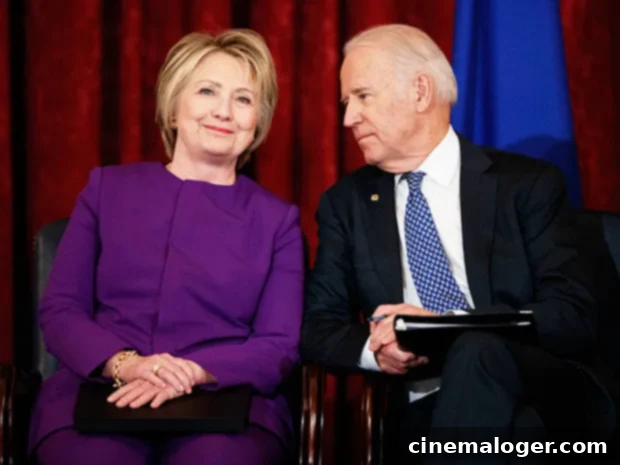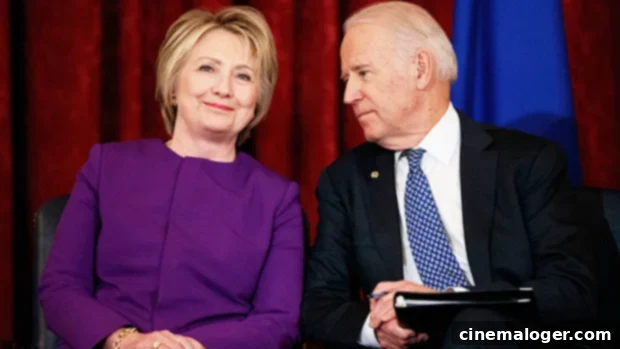Hillary Clinton on Biden’s MAGA Remarks: A Critical Warning on American Democracy’s Fragility
Former First Lady and Secretary of State Hillary Clinton offered robust support for President Joe Biden’s controversial characterization of MAGA Republicans as “semi-fascists.” Her endorsement came during an appearance on The View on Wednesday, September 7, where co-host Alyssa Farah Griffin pressed her on whether such language was “divisive.” The question naturally drew parallels to Clinton’s own experience with criticism after she labeled supporters of former President Donald Trump as “deplorables” during the 2016 election campaign. Despite the potential for controversy, Clinton lauded President Biden’s Philadelphia speech as a vital address that conveyed a powerful and necessary message. “I think he did a very important service to the country in giving the speech that he gave, because too many people are not yet aware of how fragile our Democracy is, and I’m not gonna second guess the language he used,” she asserted, emphasizing the urgency of Biden’s message.
Understanding Biden’s Philadelphia Address and Clinton’s Endorsement
President Biden’s speech in Philadelphia was a pivotal moment, delivered against the backdrop of Independence Hall. The address was not just a campaign rally; it was framed as an urgent plea to safeguard the soul of the nation. Biden explicitly warned that “Donald Trump and the MAGA Republicans represent an extremism that threatens the very foundations of our republic,” articulating a concern that resonates deeply with many, including Hillary Clinton. By labeling certain factions as “semi-fascists,” Biden aimed to highlight what he perceives as a profound deviation from democratic norms and principles within a significant segment of the Republican party. This strong language sparked immediate debate, with critics arguing it was polarizing and unpresidential, while supporters, like Clinton, saw it as a necessary wake-up call.
Clinton’s defense of Biden’s rhetoric is rooted in a palpable concern for the state of American democracy. She referenced the January 6th attack on the Capitol, along with a broader pattern of “threats of violence” and “concerns that people are expressing about the country falling apart,” as stark indicators of democracy’s vulnerability. For Clinton, these are not isolated incidents but symptoms of a deeper ailment. “I personally thought it was a strong and necessary speech,” she reiterated, underscoring her conviction that the gravity of the situation warranted plain, even provocative, language. Her perspective suggests that sugarcoating the current political climate would be a disservice to the public, preventing a clear understanding of the challenges ahead.

The Echo of “Deplorables”: Language and Political Backlash
The conversation on The View naturally led to a comparison with Clinton’s own contentious remark during the 2016 election, when she described a segment of Donald Trump’s supporters as a “basket of deplorables.” That comment ignited a firestorm of criticism, with opponents arguing it alienated voters and fueled partisan division. When confronted with this parallel, Clinton acknowledged the weight of the term “fascism,” stating, “Fascism is a very big word. I know that, but so is socialism, and the Republicans call every Democrat who wants people to have healthcare a ‘socialist.'” This response highlights a broader point about the weaponization of political labels in contemporary American discourse. She suggested that while strong language carries risks, the current environment is one where rhetorical boundaries have already been blurred by both sides of the political spectrum.
Clinton’s argument here is not to diminish the severity of labels like “fascist” or “socialist,” but rather to point out the hypocrisy of those who decry one while readily employing the other. She elaborated on her concern, “I think we do need to be careful with our language, but I think the problem is if you go through the hallmarks of authoritarian regimes, you see too many characteristics unfortunately on our Republican side.” This powerful statement shifts the focus from mere semantics to a substantive concern about a perceived erosion of democratic norms. By invoking “hallmarks of authoritarian regimes,” Clinton alludes to a range of behaviors and policies that, in her view, echo historical patterns of authoritarianism. These hallmarks typically include a disdain for democratic institutions, the suppression of dissent, the politicization of the justice system, the spread of misinformation, and the promotion of political violence.
The Fragility of Democracy: Warning Signs and Authoritarian Tendencies
The concept of democracy’s fragility, a central theme in both Biden’s speech and Clinton’s commentary, is not merely abstract. It is grounded in specific events and observable trends. The January 6th Capitol attack stands as a stark, indelible example of this vulnerability – an attempt to overturn a legitimate election outcome through force. Beyond this singular event, Clinton implicitly refers to ongoing “threats of violence” and widespread “concerns that people are expressing about the country falling apart.” These can encompass various phenomena: rising political polarization, increased threats against election workers, the spread of conspiracy theories, challenges to voting rights, and the normalization of aggressive political rhetoric.
Experts in political science and history often identify several indicators of democratic backsliding, which align with the “hallmarks of authoritarian regimes” Clinton mentioned. These include:
- Rejection of election results: Undermining faith in the electoral process and refusing to accept legitimate outcomes.
- Attacks on independent institutions: Efforts to weaken or control the judiciary, the press, or civil service.
- Erosion of civil liberties: Attempts to restrict freedom of speech, assembly, or the press.
- Politicization of law enforcement: Using government agencies to target political opponents.
- Normalization of violence: Tolerating or even encouraging political intimidation or physical aggression.
Clinton’s concern is that these tendencies are becoming increasingly visible within American political life, particularly within certain factions aligned with the former president. This isn’t just about harsh words; it’s about a perceived pattern of behavior that challenges the fundamental underpinnings of a liberal democracy.
A Call for Republican Self-Reflection and the Power of the Vote
During his Philadelphia speech, President Biden unequivocally stated, “Donald Trump and the MAGA Republicans represent an extremism that threatens the very foundations of our republic.” This firm stance sets the stage for Clinton’s subsequent call to action for the Republican party itself. Towards the end of her interview, Clinton appealed directly to right-wing voters, urging them to “reject all that, verbally, vocally in their voting and kind of re-constitute the republican party to where it used to be” in the upcoming election. Her message implies that the Republican party has strayed significantly from its historical roots and that its current trajectory, heavily influenced by Trump, poses a danger not just to the nation but also to the party’s own future. She explicitly warned that being “the party of Trump” is “dangerous” for Republicans, suggesting a path towards irrelevance or permanent damage if they fail to adapt.
This call for “re-constitution” speaks to a yearning for a return to what many consider traditional Republican values—fiscal conservatism, strong national defense, and respect for democratic institutions—rather than the populist, often confrontational, ideology that has taken hold in recent years. It is a challenge to Republicans to choose between continued allegiance to Trump’s brand of politics and a pivot back towards principles that foster national unity and democratic stability. The ballot box, Clinton emphasizes, is the ultimate tool for this transformation, empowering voters to shape the future direction of the party and the country.
Beyond Politics: “Gutsy” Conversations and Civic Engagement
Hillary Clinton’s appearance on The View was also part of a broader promotional tour alongside her daughter, Chelsea Clinton, for their new AppleTV+ show, Gutsy. The series features the mother-daughter duo engaging in conversations with influential women from diverse professions, exploring what it means to be “gutsy” in various contexts. This theme of courage and conviction resonates deeply with the political messages both women conveyed during their media engagements. At a virtual press conference for the show, both Clintons spoke with HollywoodLife about the profound importance of being gutsy, especially in the face of contemporary challenges.
Chelsea Clinton, in particular, stressed the urgency for Americans to speak out and vote as essential actions to protect equal rights. Her powerful statement encapsulated the core message of civic responsibility and active participation: “I think there just is so much gutsiness required to continue to use our voices to stand up, certainly to vote, but also to use our voices to call attention to the harms where they are happening, and also to call attention and to amplify good where it is happening, to try to help protect women, to protect kids, and to advance more opportunities for everyone to live their best, fullest lives.” This perspective transcends partisan politics, framing civic engagement as a fundamental act of courage necessary for fostering a more equitable and just society. It connects the personal stories of resilience and advocacy featured in Gutsy to the broader imperative of safeguarding democratic principles and ensuring that everyone has the opportunity to thrive.
Conclusion: Upholding Democratic Values in Challenging Times
Hillary Clinton’s unwavering support for President Biden’s strong language regarding MAGA Republicans underscores a deep-seated concern shared by many about the trajectory of American democracy. Her insights, drawing from her extensive political career, highlight a perceived shift towards authoritarian tendencies that she believes necessitate a direct and unambiguous response. The parallel drawn with her own “deplorables” comment, while inviting criticism, also serves to emphasize the escalating nature of political rhetoric and the urgent need to address underlying threats to democratic institutions. Her call for the Republican party to “re-constitute” itself is a plea for a return to traditional values that prioritize democratic norms over partisan extremism. Coupled with Chelsea Clinton’s emphasis on “gutsiness” in civic engagement and voting, the message from the Clintons is clear: the current political moment demands vigilance, courage, and active participation from all citizens to protect the foundational principles of American democracy and ensure a future where equal rights and opportunities are safeguarded for everyone.
